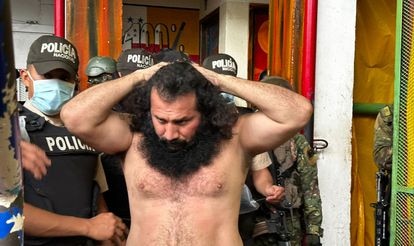
One of Ecuador’s most dangerous criminals, José Adolfo Macías Villamar (alias Fito), just released a muscle-flexing video of a narcocorrido to show the government just how powerful he really is. His transfer to a maximum security prison was short-lived, and now he’s back in his preferred prison in Guayaquil, demonstrating the government’s inability to control the powerful gangster accused of ordering the murder of presidential candidate Fernando Villavicencio. “He is the boss of all bosses — he is Adolfo Macías Villamar,” goes the song.
El Corrido del León was performed by the Mariachi Bravo duo with Queen Michelle, Fito’s daughter. It was recorded in three settings — a bar, a pasture with grazing horses and the prison where Fito is serving a 34-year sentence for murder, drug trafficking, organized crime, robbery, and weapons possession. Although inmates are not allowed to have any electronic equipment in their possession, Fito fearlessly holds sway within his prison. Searches have turned up weapons, drugs, money, cell phones, satellite equipment, drones, gym equipment and bottles of whiskey.
Faced with a professionally produced video partially recorded inside a prison and starring an affable and confident criminal, the government of Ecuador was compelled to issue a terse statement through its prison administration. “Audio recording equipment or production companies have not been authorized to enter the prison, so this equipment must have been obtained illegally.” The video’s release date was not arbitrary. It came shortly after Fito’s court-ordered transfer from the high-security La Roca prison back to the regional prison in Guayaquil, the headquarters for his criminal network.
Security analyst Fernando Carrión said about the video, “It’s a defiant declaration of victory. The lyrics are trying to legitimize its leader as someone who can bring peace among all the criminal gangs in the country.” Fito wants to change the perception of himself as a submissive inmate, which many Ecuadorians witnessed in astonishment during his transfer to La Roca. He also wants to address allegations that he ordered the murder of the presidential candidate Fernando Villavicencio. Prior to his assassination in Quito, Villavicencio said he had received death threats from Fito.
“He’s got so much love for his family / so much love for his friends / he’d do anything for them / he’d give his life and more / for those who are loyal.” These verses from El Corrido del León are what Carrión calls an anti-narcocorrido. “The Mexican corrido is all about rupture with the establishment, they are full of opulence and violence. But this video has none of that.” The social imaginary behind El Corrido del León describes what every part of society wants, says Carrión. “He has the heart of a son, a brother, and dad / for his people he has nothing but love.”
Corridos are an important part of Mexico’s musical history. They began during the Mexican Revolution in the early 20th century, when peasant songsters extolled the deeds of brave heroes in battle. “Over time, the conflict between the peasantry and the landowners escalated, causing a rupture with the establishment. This was then seized upon by drug traffickers as an opportunity to propose an even greater rupture that challenged the entire system,” said Carrión. But El Corrido del León is a song about a government that has let its prison system be overrun and ruled by criminal gangs. “Fito is the enforcer, my friends / he is the boss of bosses / he is the leader of Los Choneros.” Carrión says the reason for choosing a Mexican corrido over other popular music genres in Ecuador is to highlight the connection Los Choneros has with the Sinaloa Cartel in Mexico.
According to a criminology expert from the Ecuadorian police, criminal gangs primarily use urban music as a means to convey a message. Through videos and songs posted on social media, they justify their crimes, display weapons, and show off violence, opulence, and power. Over the past two years, Ecuadorian police have identified five performers who have been killed by rival gangs in response to their songs.
Ecuadorians first encountered a narcocorrido when the trial of Joaquín “El Chapo” Guzmán revealed his connection to their country through Captain Telmo Castro of the Ecuadorian Army. The narcocorrido praised Castro’s cunning and drug trafficking skill as he exploited corruption in the country’s justice system. “Manabí, Santa Elena and Los Ríos / is where I silently moved about / moving the kilos in small planes / from Colombia and Ecuador to Sinaloa.”
Sign up for our weekly newsletter to get more English-language news coverage from EL PAÍS USA Edition
This post was originally published on this site be sure to check out more of their content.








